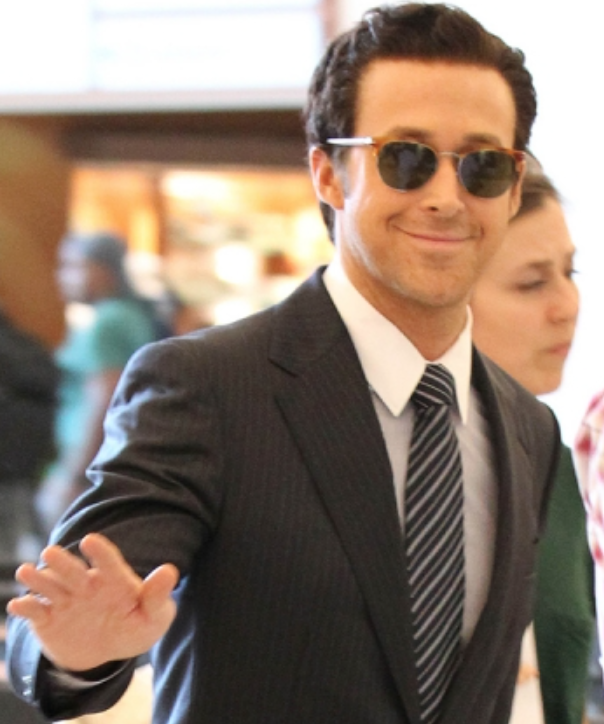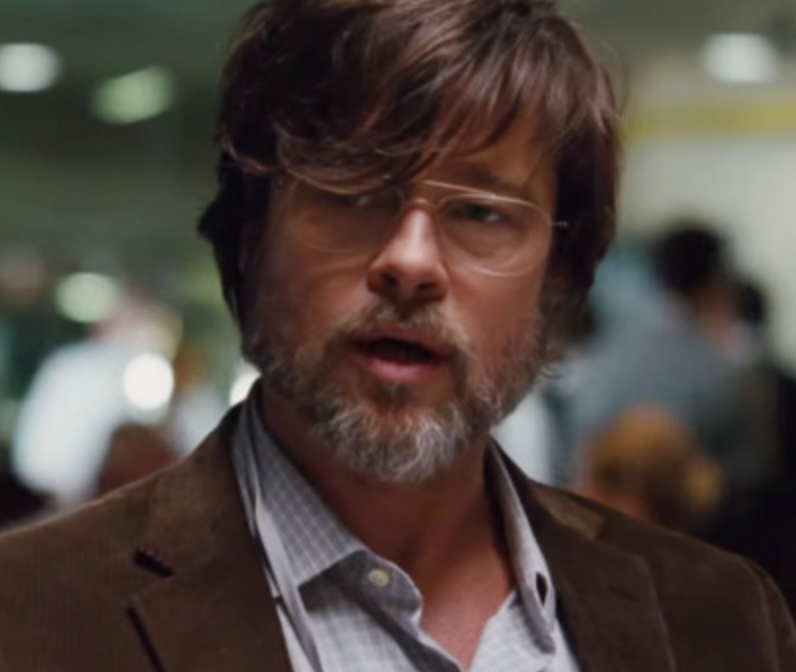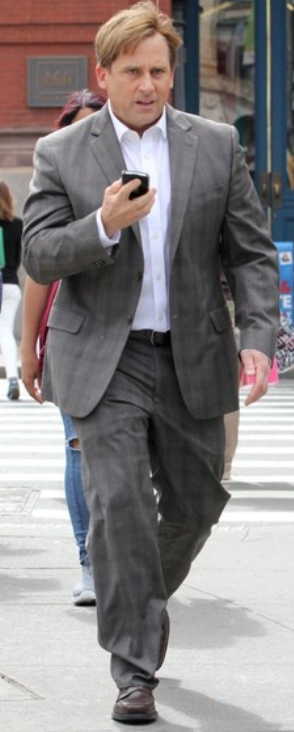 If you had told me a year ago that the most powerfully useful American film of 2015 would be brought to us by the man who helmed “Talladega Nights,” I would have told you to fix your damn time machine. Yet it is absolutely true that Adam McKay, the goofball extraordinaire who gave us such national treasures as “Anchorman,” has directed and co-written “The Big Short,” the adaptation of Michael Lewis’s 2010 nonfiction bestseller about the collapse of the subprime-mortgage market. What’s that, you say? Put simply, McKay has crafted the definitive movie about the 2008 worldwide economic meltdown that stemmed from the bursting of the American housing bubble – and he’s done so with rigorous detail and more than a spoonful of his slapstick sugar.
If you had told me a year ago that the most powerfully useful American film of 2015 would be brought to us by the man who helmed “Talladega Nights,” I would have told you to fix your damn time machine. Yet it is absolutely true that Adam McKay, the goofball extraordinaire who gave us such national treasures as “Anchorman,” has directed and co-written “The Big Short,” the adaptation of Michael Lewis’s 2010 nonfiction bestseller about the collapse of the subprime-mortgage market. What’s that, you say? Put simply, McKay has crafted the definitive movie about the 2008 worldwide economic meltdown that stemmed from the bursting of the American housing bubble – and he’s done so with rigorous detail and more than a spoonful of his slapstick sugar.
Sugar is the operative term here, and even as we’re gobbling it up, we’re made aware that this is exactly how our country got itself in such a financial black hole in the first place. Start with the eye candy that is Ryan Gosling, who plays Jared Vennett, the Slick Rick narrator doubling as a banker whose alpha-douchery actually outstrips that of his colleagues. He’s been lucky enough to notice the seemingly insane-in-the-membrane investments of financial idiot-savant Michael Burry (Christian Bale), who’s prone to blasting death rock while crunching numbers and rubbing his smelly, naked feet. After sifting through the kazillions of individual mortgages that make up the securities underwriting so much of the banking industry, Burry has decided to bet against the housing market by investing more than a billion dollars of his clients’ money into credit default swaps. Scratching your head yet? Just wait, there’s more. Vennett ropes in mega-misanthropic hedge funder Mark Baum (a wild-eyed Steve Carell), and the two go into the credit-default-swap business, as does the pee-wee investment team of Charles Geller (John Magaro) and Jamie Shipley (Finn Wittrock), who enlist former banker Ben Rickert (Brad Pitt, who also co-produces), a New Age-y Cassandra, to help them play in the big leagues.
 Rickert may be the voice of moral outrage but it’s Baum who wrestles with his conscience in a way that lays bare the horror at hand. To investigate Vennett’s claims, he and his team go down to Florida, where McMansions are populated by otherwise-impoverished families and strippers own tens of houses. (A rare downside of this otherwise forward-thinking film: the few female cast members mostly play nags and sex workers.) Baum prides himself on expecting the worst but even he’s shocked by the crassness of the young mortgage brokers who know they’re selling dud loans to innocent working people. From there, the sky’s the limit. At an industry convention in Vegas, the degree of conscious swindling boggles all the main players. “They’re not confessing,” says Baum’s coworker. “They’re bragging.”
Rickert may be the voice of moral outrage but it’s Baum who wrestles with his conscience in a way that lays bare the horror at hand. To investigate Vennett’s claims, he and his team go down to Florida, where McMansions are populated by otherwise-impoverished families and strippers own tens of houses. (A rare downside of this otherwise forward-thinking film: the few female cast members mostly play nags and sex workers.) Baum prides himself on expecting the worst but even he’s shocked by the crassness of the young mortgage brokers who know they’re selling dud loans to innocent working people. From there, the sky’s the limit. At an industry convention in Vegas, the degree of conscious swindling boggles all the main players. “They’re not confessing,” says Baum’s coworker. “They’re bragging.”
You could say the same of this film, which is the core of its genius: It’s a fine line between wisecracker and wiseman, and McKay sure has found it. By charismatically tracing the roots of the global market collapse through the eyes of those who figured out how to profit from it, he seduces us the way these men are seduced by their own greed. Fourth walls are broken, animation is deployed, flashes of mid-Aughts junk-food culture deliberately last a beat too long (think of this as super-liminal rather than subliminal advertising), and stars like Anthony Bourdain, Selena Gomez, and a naked Margot Robbie pop up in handy mini-films to explain complex financial concepts like “collateralized-debt obligations” (CDOs) and “extrapolation bias.” I honestly suggest bringing along a notepad and pencil; it’s worth grasping the full scope of the financial crimes committed, if only to register the film’s wallop of a grand arc.
 Because here’s the thing: By inspiring us to root for these financial mavericks, McKay is brilliantly inspiring us to root against the world’s economy as well as We, the American People. This genius mechanism is aided immensely by spot-on casting (everything from Pitt’s Redford-like Zen to Bale’s manic zeal are mined as handy short-hands), and it’s distinguished from Scorsese’s “Wolf of Wall Street” excess because it’s deployed so we’ll also implicate ourselves in the broken system that is now our financial reality. Here is an agitprop that captures the so-crazy-it’s-true scale of unpunished greed, ignorance, and fraud far more effectively than a naturalistic drama or documentary ever could. By the time the film suggests that today’s current anti-immigration resentment directly stems from the powers-that-be trying to save their own hides (or hide their own savings; you choose), it’s hard to deny the possibility. After all, everything else about this American Horror Story has already proven true. The biggest question of all still looms, though. Will holiday audiences bother to swallow what this extraordinary movie is selling? Sweet Saint Nick, I dearly hope so.
Because here’s the thing: By inspiring us to root for these financial mavericks, McKay is brilliantly inspiring us to root against the world’s economy as well as We, the American People. This genius mechanism is aided immensely by spot-on casting (everything from Pitt’s Redford-like Zen to Bale’s manic zeal are mined as handy short-hands), and it’s distinguished from Scorsese’s “Wolf of Wall Street” excess because it’s deployed so we’ll also implicate ourselves in the broken system that is now our financial reality. Here is an agitprop that captures the so-crazy-it’s-true scale of unpunished greed, ignorance, and fraud far more effectively than a naturalistic drama or documentary ever could. By the time the film suggests that today’s current anti-immigration resentment directly stems from the powers-that-be trying to save their own hides (or hide their own savings; you choose), it’s hard to deny the possibility. After all, everything else about this American Horror Story has already proven true. The biggest question of all still looms, though. Will holiday audiences bother to swallow what this extraordinary movie is selling? Sweet Saint Nick, I dearly hope so.
This was originally published in Word and Film.
